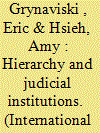| Srl | Item |
| 1 |
ID:
087579


|
|
|
|
|
| Publication |
2009.
|
| Summary/Abstract |
Democratic and autocratic states routinely violate their international agreements protecting human rights. Scholars typically link ratification and compliance behavior theoretically but test their models separately; however, if the behaviors are jointly determined then we should treat them that way empirically. We consider how domestic judiciaries influence the joint choice to ratify and comply with international human rights regimes. Using data on the ratification status of states under the Convention Against Torture (CAT), states' torture practices, and a series of measures of judicial effectiveness, we examine whether legal institutions are likely to constrain state behavior and by implication raise the costs of ratification.
|
|
|
|
|
|
|
|
|
|
|
|
|
|
|
|
| 2 |
ID:
140354


|
|
|
|
|
| Summary/Abstract |
International arbitration is a distinctive feature of both contemporary international politics and the ancient world. Explanations of arbitration in the international relations literature generally posit that states engage in arbitration to mitigate the effects of competition in an anarchical system, or that the practice of arbitration reflects democratic norms. However, an examination of arbitration during the paradigmatic case of the Hellenistic period (338–90 bce) casts doubt on the existing literature. Hierarchy rather than anarchy better characterizes the political context in which arbitration took place: the Greeks often organized themselves into alliances or leagues in which a hegemon dominated decision making, or into federal states with a common foreign policy. This hierarchical setting was a necessary condition for international arbitration where the practice of arbitration was a tool to legitimize hierarchical powers. We assemble an original data set of Hellenistic arbitrations, and use qualitative comparative analysis to show that hierarchy was almost always a necessary condition for international arbitration. Process-tracing of arbitration under three political orders—hegemonic kingdoms in the Greek world, Greek federations, and the Roman Empire—shows that arbitration as a particular means of dispute resolution was used as an ideological device to build and legitimize international order. We then analyze the contemporary record, finding a role for hierarchy in modern international arbitration.
|
|
|
|
|
|
|
|
|
|
|
|
|
|
|
|
| 3 |
ID:
191908


|
|
|
|
|
| Summary/Abstract |
Scholars often assume that courts in authoritarian regimes cannot credibly protect foreign investors’ interests because these institutions lack judicial independence. In this article, we construct a novel data set on multinational corporations’ litigation activities in Chinese courts from 2002 to 2017. This supports the first systematic case-level analysis of foreign firms’ lawsuit outcomes in an authoritarian judiciary. We find that foreign companies frequently engage in litigation in authoritarian courts. Moreover, we theoretically and empirically distinguish between two types of government–business ties in terms of their effectiveness in incentivizing the host state to protect foreign investors’ interests. We argue that ad hoc, personal political connections deliver only trivial lawsuit success for multinational enterprises, while formal corporate partnerships with regime insiders can lead the state to structurally internalize foreign investors’ interests. In particular, we demonstrate that joint venture partnerships with state-owned enterprises help foreign firms obtain more substantial monetary compensation than other types of multinational enterprises. By contrast, the personal political connections of foreign firms’ board members do not foster meaningful judicial favoritism. These findings are robust to tests of alternative implications, matching procedures, and subsample robustness checks. This article advances our understanding of multinational corporations’ political risk in host countries, government–business relations, and authoritarian judicial institutions.
|
|
|
|
|
|
|
|
|
|
|
|
|
|
|
|